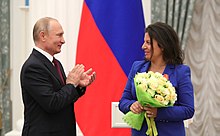Putinism
Appearance

Putinism (Russian: путинизм, putinizm) is the social, political, and economic system of Russia formed during the w:political leadership of Vladimir Putin. It is characterized by the concentration of political and financial powers in the hands of "siloviks", current and former "people with shoulder marks", coming from a total of 22 governmental enforcement agencies, the majority of them being the Federal Security Service (FSB), Ministry of Internal Affairs of Russia, Armed Forces of Russia, and National Guard of Russia.
Quotes
[edit]- I think the idea people had after 1991 that there would be a quick transition is clearly wrong... A lot of it has to do with relationships with economic growth because I think in really high-growth countries with a large middle class, with lots of educated people, there is a tendency to demand greater political participation... I think what you are seeing with the rise of Putinism in Russia and in parts of Eastern Europe is in a way the failure of that kind of modernization to produce a really broad middle-class society... His model is based on a narrow energy-dependent economic model which right now is falling apart... I think what is happening in Russia right now as global commodity prices have fallen is the exposure of the hollowness of this and we will see after another decade of economic failure whether Russians really think this is such a great alternative to the kind of both freedom and prosperity that is seen in Western Europe.
- Francis Fukuyama, as quoted in "Fukuyama: 'Putinism', Radical Islam No Alternative To Liberal Democracy" (30 January 2016), by Charles Recknagel, Radio Free Europe: Radio Liberty.
- History shows that the process of modernization leads societies to form liberal democracies with market systems. Yet some leaders insist on trying to create alternative models, even though those models are unstable and retrograde. Putin's authoritarian effort to create a managed democracy in Russia offers a good example... After the collapse of the Soviet Union in 1991 many people expected Russia to make a rapid transition from communism to democracy... However, what followed in Russia was a period of experimentation with relatively greater liberalism under President Boris Yeltsin that led not to democracy, but the rise of Putin and an authoritarian system... Putin's authoritarian system does not mean that he has built a successful alternative to liberal democracy. Instead, the system owes its existence in part to the slow development of a middle class in Russia that normally would demand a share of power. That slow development, in turn, is largely thanks to the state's monopolization of the country's most lucrative business activities: the export of energy and other natural resources.
- Charles Recknagel, "Fukuyama: 'Putinism', Radical Islam No Alternative To Liberal Democracy" (30 January 2016), Radio Free Europe: Radio Liberty.
- In 1999 the ailing Yeltsin anointed a former Leningrad KGB boss, Vladimir Putin, as his successor. The contrast was total. Putin was the epitome of a tough, communist-era apparatchik. The ex-intelligence officer had no time for the niceties of democracy, but a keen sense of the need to restore Russian pride. He would issue pictures of himself hunting and bare-chested on horseback. His court of oligarchs made sure he secured as much overseas wealth as they had. Putin’s politics, endorsed at increasingly rigged elections, made no mention of civil rights or market economics. He was a populist and a nationalist, his pledge merely to restore Russia’s integrity and self-confidence. Opponents were bribed, imprisoned or killed. The west might have felt able to humour and torment Yeltsin. It now faced the pastiche tsar of a macho state. That Russia’s economy was debilitated was irrelevant. Dictatorship thrives on poverty.
- Simon Jenkins, A Short History of Europe: From Pericles to Putin (2018)
- The predominance of the intelligence services and mentality is a core feature of Putin’s Russia that marks a major and critical discontinuity from not only the 1990s but all of Soviet and Russian history. During the Soviet period, the Communist Party provided the glue holding the system together. During the 1990s, there was no central organizing institution or ideology. Now, with Putin, it is “former” KGB professionals who dominate the Russian ruling elite. This is a special kind of brotherhood, a mafia-like culture in which only a few can be trusted. The working culture is secretive and nontransparent.
- Andrew Kuchins, "Alternative Futures for Russia to 2017 A Report of the Russia and Eurasia Program", Center for Strategic and International Studies (November 2007), p. 5.
- We are hurtling back into a Soviet abyss, into an information vacuum that spells death from our own ignorance. All we have left is the internet, where information is still freely available. For the rest, if you want to go on working as a journalist, it's total servility to Putin. Otherwise, it can be death, the bullet, poison, or trial - whatever our special services, Putin's guard dogs, see fit.
- Anna Politkovskaya, as quoted in "Poisoned by Putin: The horror of Beslan was made still worse by the intimidation of Russia's servile media" (9 September 2004), The Guardian, United Kingdom: Guardian News and Media Limited

